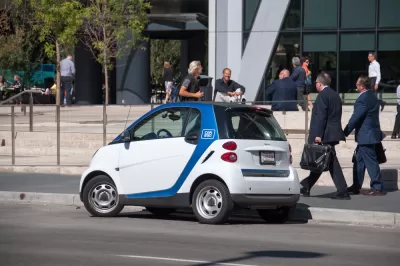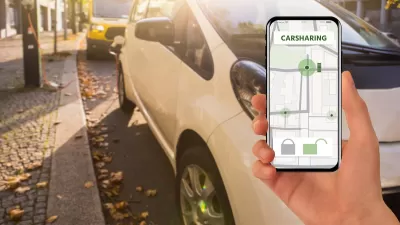Research shows that consistent access to shared cars drastically reduces car ownership rates, but U.S. regulations often impede success for private fleets.

Nicole A. Murray argues that, while politicians and media tout programs like congestion pricing and parking minimums to reduce the number of cars in cities, "there is one unsung tactic that reduces the number of cars on the road and their consequences without big public investment, redevelopment, or a toll on central-business-district-bound drivers: expanding car access through car share."
Murray clarifies that, unlike ride-hailing services, "[c]ar share is the actual sharing of a vehicle among several people. Arrangements can entail formal corporate rentals from car lots (Hertz, Zipcar), point-to-point sharing in which cars can be picked up and dropped off anywhere in a defined zone (Car2Go), peer-to-peer sharing in which members can rent out their cars (Turo, Getaround), and informal arrangements such as sharing among housemates and carpooling."
"To reduce (or even ban) private cars in the city, we should socialize them." Such arrangements would give more people access to cars when they need them while discouraging private car ownership. While New York's Department of Transportation "quietly expanded and made permanent its program to provide street and municipal-lot parking spaces for car-share services in April," it "could go further and municipalize its own fleet into a car-share one, perhaps starting by repurposing the NYPD’s huge cache of 9,000 SUVs, sedans, and smart cars."
These arrangements work because ownership of a car is not the same as unrestricted access to one, and in fact can be a barrier to access: crushing maintenance costs; predatory subprime loans and skyrocketing insurance rates; damage or theft because of lack of safe storage or driving conditions; and of course, fuel costs, not just on personal wallets but on the planet for the massive oil infrastructure needed to support this country’s about 90 percent personal car-ownership rate. Individualizing ownership means individualizing these costs and risks, especially on those most vulnerable economically.
Boosting car share by providing infrastructure, funding, and reducing regulatory barriers, Murray says, would "expand further the benefits and reach of car share in the city and beyond."
FULL STORY: OPINION: To Ban Cars, Socialize Them

Alabama: Trump Terminates Settlements for Black Communities Harmed By Raw Sewage
Trump deemed the landmark civil rights agreement “illegal DEI and environmental justice policy.”

Study: Maui’s Plan to Convert Vacation Rentals to Long-Term Housing Could Cause Nearly $1 Billion Economic Loss
The plan would reduce visitor accommodation by 25% resulting in 1,900 jobs lost.

Planetizen Federal Action Tracker
A weekly monitor of how Trump’s orders and actions are impacting planners and planning in America.

Waymo Gets Permission to Map SF’s Market Street
If allowed to operate on the traffic-restricted street, Waymo’s autonomous taxis would have a leg up over ride-hailing competitors — and counter the city’s efforts to grow bike and pedestrian on the thoroughfare.

Parklet Symposium Highlights the Success of Shared Spaces
Parklets got a boost during the Covid-19 pandemic, when the concept was translated to outdoor dining programs that offered restaurants a lifeline during the shutdown.

Federal Homelessness Agency Places Entire Staff on Leave
The U.S. Interagency Council on Homelessness is the only federal agency dedicated to preventing and ending homelessness.
Urban Design for Planners 1: Software Tools
This six-course series explores essential urban design concepts using open source software and equips planners with the tools they need to participate fully in the urban design process.
Planning for Universal Design
Learn the tools for implementing Universal Design in planning regulations.
Caltrans
Smith Gee Studio
Institute for Housing and Urban Development Studies (IHS)
City of Grandview
Harvard GSD Executive Education
Toledo-Lucas County Plan Commissions
Salt Lake City
NYU Wagner Graduate School of Public Service




























